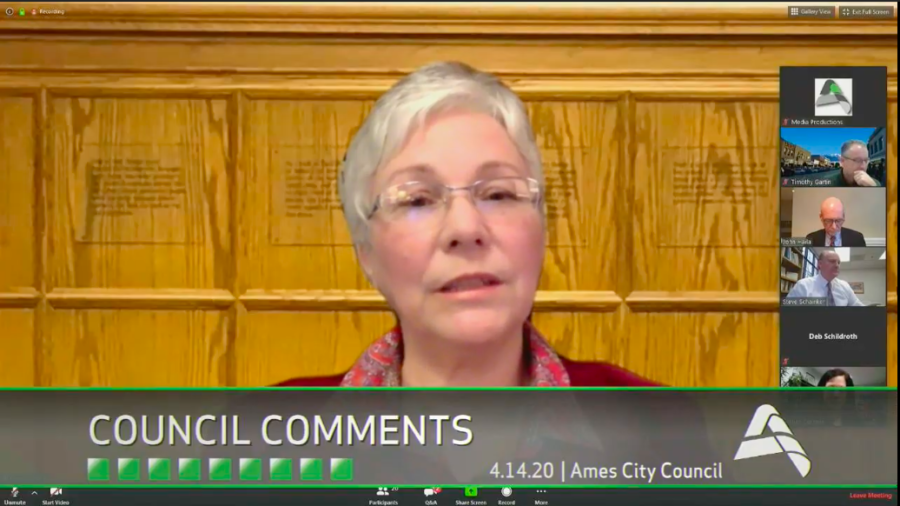Ames City Council approves to transfer funds for Emergency Shelter
Gloria Betcher, Ward 1 representative, providing input during the Ames City Council meeting on April 14. The meeting took place during a Zoom conference call.
April 14, 2020
The Ames City Council voted to approve a transfer of $6,569.31 to Emergency Shelter within Emergency Response Project’s (ERP) allocations from Service Coordination
The meeting took place at 6 p.m. April 14 over a Zoom conference call.
Ames City Council approved to increase the city’s fiscal year 2019-2020 allocation for Emergency Shelter after exhausting it in February.
The ERP temporarily closed its shelter and limited the number of people in hotel rooms as a response to the COVID-19 pandemic, according to the document, and as a result of the cost to utilize a hotel room has increased.
The change would bring the total allocation to $84,437 for Emergency Shelter within the ERP’s allocations.
“Funds for Service Coordination in the amount of the $6,569.31 are available to reallocate to Emergency Shelter services as a short-term 2 solution,” according to the document. “ERP is developing a funding proposal for ASSET funders to consider that would help them with Emergency Shelter services through June 30, 2020.”
The Council also approved the third passage and adoption of an ordinance increasing water rates by 2 percent and sewer rates by 5 percent, effective July 1.
The increase will be used to fund ongoing operations and maintenance budget plus the anticipated capital improvements projects. The increase also funds the state-mandated improvements to the wastewater plant in accordance with the Iowa Nutrient Reduction Strategy.
In addition to the increased water and sewage rates, the Council also approved a new traffic system, GRIDSMART with an amount that will not exceed $271,825 as a sole source purchase.
Until the intersection improvement project has finished its bids and approved by the Council, the traffic systems will not be purchased.
“The idea is to have cameras suspended over intersections to get a fish-eye lens view of everything that’s happening at the intersection,” said Ward 3 Rep. David Martin. “And then that gets coupled to software that makes sort of real time traffic decisions that will overall improve traffic flow.”
GRIDSMART has a 360-degree camera with real time data on the vehicles such as volume, turning movements, traffic counts and length-based classification.
“I want to make a couple of things clear first I think we all know that it is not there for automated ticket writing for people who run through red lights,” Martin said. “It’s also not there in order to pick up video for automated face recognition and do anything with that it’s really just there for the traffic as I understand it.”
In addition, GRIDSMART uses a tracking technology that starts tracking vehicles 350 feet from the camera in each direction. The system is simple to install, which includes free software with multiple users able to access at one time.
Martin said during the test phase, there is a potential for the video recorded will be retained beyond the needed time to make instantaneous decisions about traffic. Martin moved for a motion to ask city staff to provide a memo describing the policy for the retention and how it would apply to the system.
“I am interested in making sure that we understand the privacy implications of the video that we’re collecting properly and we’re making the right decisions,” Martin said.







